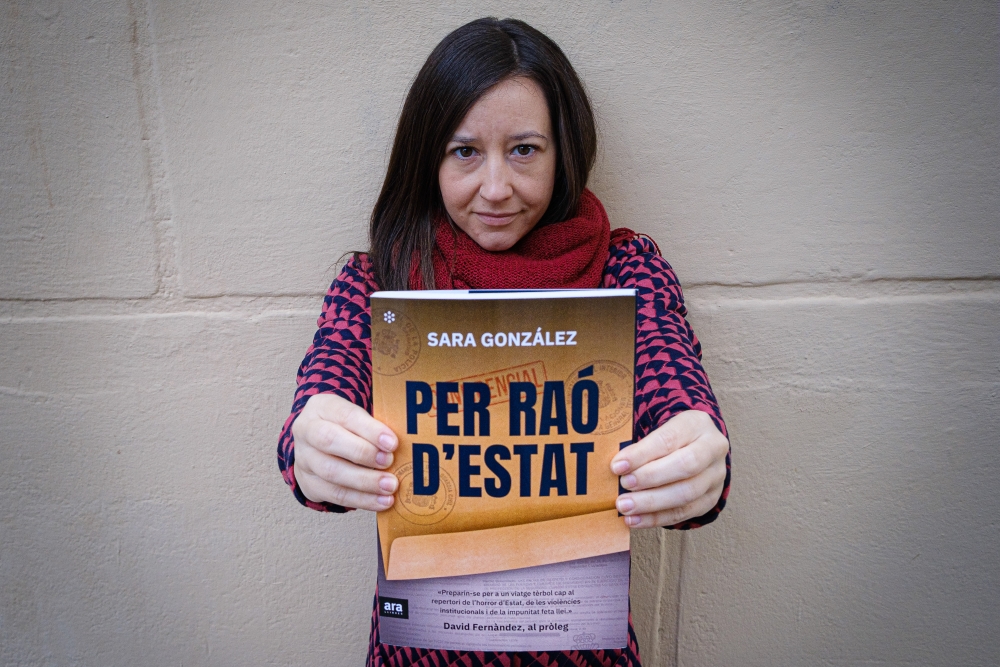
- Sara González (Sant Celoni, Catalonia, 1985) is a journalist and political analyst. He has highlighted the criminalization of dissent in his book Per raó d’Estat (for reasons of state), delving into the political, police, judicial and media structures of the Spanish State’s strides.

Is it clear who is behind the sewer structures of the Spanish State?What
has made it clear to me is that it cannot be ensured that there is a certain group of people who work hierarchically and decide how, when and how to act in an office to protect state funds. If so, it would be easily detectable. The proof is that the closest thing to this system is the so-called “patriotic police”, which has been identified after a war between commissioners.
Unfortunately, the system is much more complex, a web that has several elements: an ultra-conservative political tendency; exceptional legislation reinforced for 40 years against ETA terrorism that is maintained despite the disappearance of the organization; a broad-based police culture; judges prone to accepting police accounts and a media system acting as a loudspeaker.
What is the challenge of this structure?The deactivation
of the movements, political ideologies and phenomena that they consider to pose a threat to reason of state. It can be said that there are three aspects he defends: territorial unity, the principle of order and power and the defense of the capitalist system. To do so, they try to make public opinion dependent through police and judicial actions. Fear is the weapon to control society.

You claim that punishing dissent is not a new thing. To what extent do you believe that in Catalonia knowledge of the repressive reality has only spread to the independence process? Physical
and temporal distance distort reality, even more so when the memory of society is short. The majority of Catalan society has not known the Basque conflict for a long time, since for decades the persecution of movements such as the Abertzale Left or anarchism in the fight against terrorism has been justified. And there is no awareness of what has been done in Euskal Herria until it has been applied in the Catalan conflict. Then comes the awareness that there is a model that repeats itself over time and exceptional legislation, with a decisive difference: The absence of a terrorist organization in the conflict in Catalonia.
Martxelo Otamendi and Iñaki Abadena are the testimonies of the Basque dissent in their book. What did the conversations look like?
They were very emotional and paradigmatic precisely to understand that model I'm talking about. As I have been opened to understand their suffering, both are a clear example of the generosity of the book's testimonies. Otamendi is a great communicator and is able to explain in detail the tragedy experienced, even after seventeen years. Abad, which is still serving its sentence, conveys the helplessness and despair to cope with its daily life.
What reading do you do after interviewing?First
of all, that being a victim of such an operation causes a collision and that there is no repair. The torturers of Otamendi have not been censored; both the police and the summary reports are scrambling like a pickle. On the other hand, after the accusation of terrorism there are other plans and it is in the political interest to keep the ghost of ETA alive. A model that has recently moved to Catalonia, for example, linking CoR activists with violence or terrorism, as was the case with Tamara Carrasco.
You mentioned that the media are part of the stools.
When the media disseminates to the headlines the report of the accusation as a complete truth and presents as “presumed” police suspicions, they contribute to the public producing a concrete report. No doubt. And then, when that story goes apart, if journalists don't give acquittal the same importance as accusation, they cause double injustice.
He has also spoken to former Spanish Minister of the Interior, Jorge Fernández Díaz. What was it like?
I asked him everything I had to ask and he answered everything, although I did not agree with my approach. And, of course, his intention was to defend, first his own purity and then that of police and judicial action.
It has shown that independence in Euskal Herria and in Catalonia and the environment of Podemos have been harassed by the security forces. Do you think you have cooperated sufficiently with each other politically?
By no means. Repression and being a victim of the same network should promote solidarity, which has not been for the party struggle. On the contrary, when the sewers have activated the disputes against independence, We can have tried to move on tiptoe, especially since they rule in the Moncloa. And vice versa, when Podemos has been in the eye of the hurricane. Instead of squeezing out the shared struggle between the two movements that have most shaken the status quo in recent years, each has prioritized its benefit to the detriment of the other.
“I did a technological baccalaureate with the intention of studying architecture. But on the selectivity portal, I changed my mind: I've always liked to write, especially to describe the reality around me. With regard to the attacks of 11 September 2001, I was interested in the role of the media. The newspaper is my natural habitat. But I learn a lot from my radio and television collaborations: having a microphone in front of me or signing the articles I write is a big responsibility. That’s why I make a special effort to reason clearly, taking into account all the ends of a reality and understanding that there may be different views.”